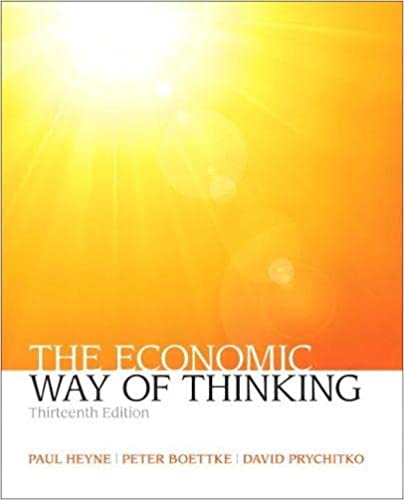
The Economic Way of Thinking 13th Edition by David Prychitko, Peter Boettke, Paul Heyne
Edition 13ISBN: 9780132992695
The Economic Way of Thinking 13th Edition by David Prychitko, Peter Boettke, Paul Heyne
Edition 13ISBN: 9780132992695 Exercise 6
How independent of each other are monetary policy and fiscal policy?
(a) Under what circumstances could the federal government run a large budget deficit without thereby producing an increase in the size of the money stock?
(b) Suppose the Fed determined to run a "tight" monetary policy, allowing no growth in commercial bank reserves, at a time when the federal government was trying to borrow to finance a large budget deficit. What would happen?
(c) Assuming that interest rates are set by the demand for and supply of loanable funds, under what circumstances could a large increase in federal government borrowing not produce higher interest rates?
(d) Suppose the Fed tries to prevent the increased government demand for loanable funds from raising interest rates by increasing the supply of loanable funds through an expansion of commercial bank loans. Will this Fed policy succeed in preventing interest rates from rising? At what point will the Fed's expansionary policy step up the inflation rate? How will the expectation of a higher rate of inflation cause interest rates to rise?
(e) Suppose that the federal government begins to run a large budget deficit at a time when many productive resources are idle-factories are operating far below capacity in most industries, and there are surplus supplies of labor in almost every area of the economy. How might the existence of all these idle resources prevent even a very large increase in government borrowing from leading to an increase in interest rates?
(a) Under what circumstances could the federal government run a large budget deficit without thereby producing an increase in the size of the money stock?
(b) Suppose the Fed determined to run a "tight" monetary policy, allowing no growth in commercial bank reserves, at a time when the federal government was trying to borrow to finance a large budget deficit. What would happen?
(c) Assuming that interest rates are set by the demand for and supply of loanable funds, under what circumstances could a large increase in federal government borrowing not produce higher interest rates?
(d) Suppose the Fed tries to prevent the increased government demand for loanable funds from raising interest rates by increasing the supply of loanable funds through an expansion of commercial bank loans. Will this Fed policy succeed in preventing interest rates from rising? At what point will the Fed's expansionary policy step up the inflation rate? How will the expectation of a higher rate of inflation cause interest rates to rise?
(e) Suppose that the federal government begins to run a large budget deficit at a time when many productive resources are idle-factories are operating far below capacity in most industries, and there are surplus supplies of labor in almost every area of the economy. How might the existence of all these idle resources prevent even a very large increase in government borrowing from leading to an increase in interest rates?
Explanation
Economic influences are control and gove...
The Economic Way of Thinking 13th Edition by David Prychitko, Peter Boettke, Paul Heyne
Why don’t you like this exercise?
Other Minimum 8 character and maximum 255 character
Character 255


